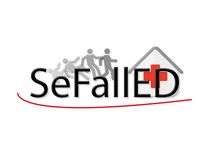iSeFallED
iSeFallED
iSeFallED - Tailor-made interventions to preserve function for older patients after an index fall with presentation at the emergency center without inpatient admission
(Tailored interventions to prevent functional decline after a Sentinel Fall presenting to the Emergency Department - iSeFallED)
Falls in older adults can have serious health consequences. Particularly serious falls that require a visit to the emergency room, for example, often lead to restrictions in functional ability, independence and quality of life. The prevention of falls is therefore of central importance, not least because the treatment of falls and the consequences of falls generate considerable costs for the healthcare system.
Secondary prevention, i.e. preventive measures that take place after people have already fallen, is particularly important. This is because the need for such measures is often only recognized at this point. However, there are currently no structured aftercare programs for people who present to the emergency room with a fall. The focus here is on treating acute symptoms and the causes of a fall or potential consequences are only given secondary consideration.
The iSeFallED project aims to address the lack of structured programs and expertise for initiating fall prevention measures in various sectors of the German healthcare system, thereby improving the chances of effective and affordable treatments for older people at risk of falling. As part of the project, patients are recruited after a fall in the emergency room and examined for their individual risk of functional limitations using a risk screening based on the findings of the predecessor project "SeFallED". Based on the screening results, patients are divided into different groups in order to enable tailor-made and patient-centered secondary prevention interventions. In addition to providing information material on active and fall-free ageing, special exercise programs that include balance and functional exercises are offered in both individual and group training sessions. These are designed to help patients reduce their personal risk of falling and strengthen them in restoring or maintaining their functionality. Follow-up during home visits, in which a varied and extensive geriatric test battery is carried out, provides evidence for further statements about the functional course of the test subjects, including potential subsequent falls.
The project focuses on analyzing the acceptance, feasibility and effectiveness of the secondary prevention program to be implemented. The involvement of those affected, relatives and other stakeholders plays a central role in this and is implemented in a participatory approach through a project advisory board, among other things. Focus groups will also be conducted to gain insights into the planned interventions. In addition, the establishment of a university outpatient clinic and cooperation with local stakeholders, such as the city sports association and local sports providers, will create a supportive network to establish long-term treatment pathways and implement sustainable secondary prevention strategies. Other focal points of the project are the further development of an algorithm for machine learning and the consideration of socio-economic characteristics.

